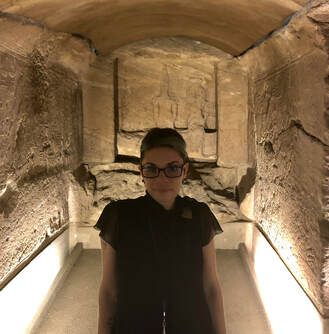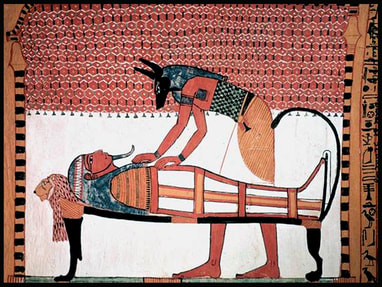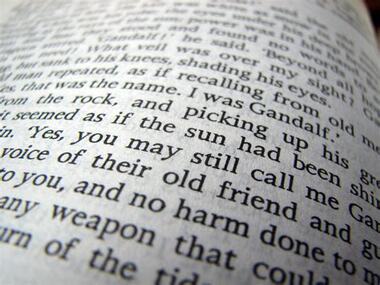You are officially studying Egyptology at UBC but we bumped into each other during a fantasy reading event at White Dwarf Books in Vancouver. Of course, I do not find this surprising as most fantasy is inspired in part or in whole by history and mythology. As someone who studies these subjects formally, how does your academic background influence your experience of reading fantasy novels? Well, I do read novels that are set in an Egyptian context now, as I can understand the obscure the facts, even though they are very much exaggerating the culture. Authors like Wilbur Smith, and Elizabeth Peters (Elizabeth is actually an Egyptologist). But when it comes to classical fantasy books, I don’t think it has really changed anything. Other than not having a lot of time to read novels outside of studying. So I would say that I tend to read more YA or Adult fantasy that isn’t a huge epic, just because I don’t have the time or brain power to “study” another huge story. Authors like George, R.R. Martin, or Steven Erickson are way too “intense”. Authors like Jim Butcher, Brandson Sanderson, Dan Brown, etc…are ones I tend currently to gravitate towards. I love fast paced adventure. Of course there is Tolkien! He is my ultimate favourite! Well, I do read novels that are set in an Egyptian context now, as I can understand Your studies in Egyptology and ancient cultures have taken you to many incredible destinations including Turin, Italy and Cypress in the Eastern Mediterranean. What is the next travel destination on your research list and what do you hope to study there?
"I went to the Chicago museum which is attached to their Art Institute, and it was amazing. But I didn’t know what I was seeing, till after I started studying art history and then it made those pieces understandable in a whole new context." In your interview on The Tipsy Archives (a history podcast featuring just the right amount of wine) you mention that you have always been inexplicably drawn to Egyptian history and myth. I myself am drawn to the body of stories that make up the Norse myths and also have a hard time explaining what it is about them that I find so intriguing. Where do you think the power of myth is rooted and what about these stories makes them relevant today? Ooh, that is a tough question, as we talked about briefly in person and via email, I too am also drawn to Norse myth, I have just academically studied Egyptian myth more. I think the power of myth lies in its ability to captivate a reader/listener because it is relatable. In myth, a reader can find hidden cultural gems of information that would otherwise have not been discovered. There is only so much that archeological evidence can tell us, albeit quite extensive, but nevertheless myth and story hold a culture’s “essence” or values. It is important I feel, for us to share and remember these stories cause then these cultures that do not exist in the same fashion as they used too come back to life and are remembered. There is only so much that archeological evidence can tell us, albeit quite extensive, In your essay The Portable Shrine of Anubis, you mention how the discovery of King Tutankhamun’s tomb gave archeologists unparalleled access to information about Egyptian death customs which other fields of archeological study surely view with envy. As we come from a modern North American culture that does not like to dwell on death (but rather obsesses over a glorified version of youth), what strikes you as profound in ancient Egyptian beliefs about death?
"Most seem to think that they are a culture that is obsessed with death, and that they worship it (hence all the pop culture-egyptianizing) but they were in fact quite scared of death, and as such had all of their rituals around death so that they could keep on living in the next area they called The Field of Reeds." Same like the grave goods, as you needed all of those items with you so that you could continue on. For the Egyptians, magic and death were literal. For example, if you drew a person missing an arm, then that person would have no arm in the next life. So you needed to make sure that once something was drawn, written, placed, that made it so. Death and life were interconnected to them. In your research paper Soundscaping in the Ancient World: Weaving through the Writings of Time you discuss the importance of sound, as well as silence, in Egyptian language and culture. As my field of study involves the language Old Norse, sound becomes paramount because it was an oral culture with no official written language. However, today so much communication happens visually instead of audibly. What do you think we lose when we move away from auditory language towards text-based communication?
"I think we lose the emotions. We lose empathy. We lose our ability to become personal with people." The ideological fanatics Nazi Germany in World War II seemed drawn to myths and sought to exploit them for their cultural power. Beyond the Germanic and Norse myths, Nazi archeologists tried, in a bizzare blending of fact and fiction, to prove that the Egyptian pharaohs were ancient Aryans. These bewildering notions still feature heavily in popular conspiracy theories. What do you think the role and responsibility of researchers and historians is in addressing such wildly inaccurate and potentially destructive ideas? Researchers, historians and archaeologists need to publish their work!!! This is a real problem! There are many people out there who are doing amazing studies but that information never gets told to the public, and therefore stupid theories arise and you get Egyptomania and the misinformed meanings of symbols, be they Egyptian or Nordic. "Researchers, historians and archaeologists need to publish their work!!! This is a real problem!" As our role is to study the past, we need to do that in a professional, respectful way and to realize that it doesn’t matter where people come from or what they believe in, we are all here on this planet and we are here to keep our heritage alive. It is about cultural heritage. Educating and involving the locals about their own culture so that they can learn about what was lost to them as well as to us. "It is about cultural heritage. Educating and involving the locals about their own culture Where can Egyptology fans find more of your work and stay up to date on your latest research? Ha! I will be uploading some of my essays, like the ones that you mentioned here, on my academia.edu page (once school is finished).
0 Comments
Leave a Reply. |
AuthorJoshua Gillingham is an author, editor, and game designer from Vancouver Island, Canada. Archives
April 2022
Categories
All
|





 RSS Feed
RSS Feed
